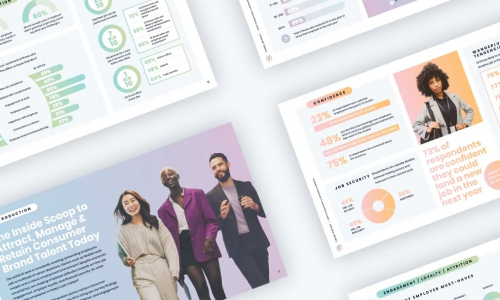Did you receive a raise within the last year? Are you satisfied with your current compensation?
In ForceBrands’ Consumer Talent Compensation and Job Market Confidence Trend Report, we uncover compensation and job market confidence trends and their impact on employee attraction, retention, and workplace attitudes. We surveyed more than 1,000 workers across various industries and demographics in the U.S.
Our findings reveal that while both compensation and confidence in the job market are high, despite economic uncertainty, talent is still very much on the move.
Read on for some highlights from our report as it relates to salaries and overall compensation satisfaction.
Compensation increased
A whooping 80 percent of survey respondents received a raise within the last year. Of those who received a salary bump, 40 percent said the amount was more than last year’s raise.
So who got paid what? According to our findings, 50 percent of raises were between 1-5 percent; and 25 percent received a raise of 9 percent or more.
But for those looking to make a bigger leap in overall pay, they looked to new jobs.
Job hopping remains one of the most lucrative ways to receive the biggest pay increase. Sixty percent of those who received a raise of 20 percent or more were in new jobs.
When it came to bonuses, half of our respondents received a bonus, but only one-third received the full amount.
Despite these salary increases, overall compensation satisfaction is low
Just forty percent of survey respondents are satisfied with their compensation, despite the salary increases. So where do we go from here? Employers should take note: those who are displeased with their salaries are two times more likely to leave their employer in the next year for a higher-paying role.
The cost of inadequate compensation
When it comes to attracting and retaining top talent, compensation is table stakes. Our data found that when employees are unsatisfied with their pay, they’re more likely to leave. Half of those who received a raise below 5 percent plan to leave their current jobs.
The negative impacts of inadequate compensation go beyond simply looking for a new role. Those dissatisfied with their compensation were also less loyal, more likely to be unhappy with their employer, less engaged, more likely to be disconnected from the company’s mission, and unlikely to recommend their company to others as an employer.
The fine print
Even in times of economic uncertainty, employers should be mindful of fairly compensating their employees. The cost of inadequate pay may result in losing top talent and worse, paying for it later in the cost of hiring and onboarding new employees. So while compensation might be high, it might not be high enough.
ForceBrands offers end-to-end hiring solutions for all stages of growth. Whether you’re just starting to hire or are looking for the next step in your career, we’re here to help you be a positive Force that makes an impact.






